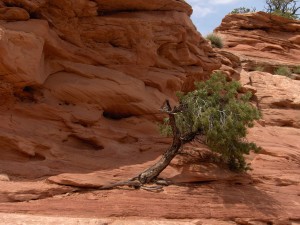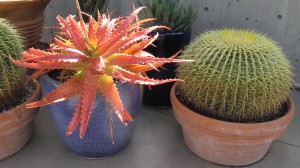…and speaking of trust, what do we do with disappointment?
There was a stage in my life when I maintained two huge gardens: a flower garden outside the parsonage which was our home in western Massachusetts, and a vegetable garden a mile away in an area offered to residents of the town by a local school.
My path to those gardens was a winding and occasionally rocky one which started very young. I must confess that I barely remember this incident, but my grandmother told me about it more than once. Apparently my great-grandfather – who had the wonderful name: Ransom Randall Rhodes – had helped me plant a row of carrots during a visit to his farm when I was somewhere between 3 and 4 years old (and he was over 90!) Carrots grow pretty fast, so he must have figured that they fit well with a 3-year-old’s attention span.
On my next visit, the carrot seeds had sprouted and the green lacy tops were showing. My grandmother pointed them out and told me those were my carrots. She and her father then went on to admire other plants, exchanging wisdom and pondering the kind of questions gardeners find riveting. And I was left to my own devices. I can only assume that somewhere in my young brain there was a puzzlement about those green lacy tops that did not look anything at all like a carrot because when my grandmother and great-grandfather finally refocused on me, I had gone down the entire row carefully pulling each plant from the ground looking for the carrot. My grandmother would inform me with pursed lips that her father had just laughed – from which I always assumed, she had failed to find it funny.
So it seems to me that there is a lot of trust required for gardening: trust that the seeds will sprout, that the weather will stay reasonably clement, that one will be able to tell the weeds from the wheat (in the words of the parable), that the carrots are really growing even when they can’t be seen, and that you will be faster than the rabbits or deer or birds when it comes to the harvest. Which means that disappointment is also part of the territory, so to speak, woven right in there along with the trust. The carrots turn out to be bitter, the lettuce bolts in the heat, every single tomato has one bite taken out of it, hail destroys the plant before it produces.
Speaking totally personally, I would observe that when the disappointment ramps high enough, the trust dries up. The urge to tweak things or prune something out of season or just plain meddle gets the better of me. I am right there with Oliver Cromwell who is credited with saying, “Trust in G-d, and keep your powder dry.” I tell myself that I am trusting in the inherent power of growth, but I really want to keep it firmly under my control.
I collude with the disappointment to create the very situation I am trying desperately to avoid. Does this ever happen to you? Do you ever become a demon for neatness? Do you ever over-water? If you are like me, you hover and twitch; you impatiently pull up plants that would recover just fine in the overnight cool, and plant others in the heat of the day and the heat of inner turmoil which is the very worst time to plant anything. In the process, we are not only seriously interfering with our future harvest, we are cutting ourselves off from grace.
Grace is the unexpected surprise; the moment when the universe shifts ever so slightly and we see with new eyes; the blessing where we were expecting a curse.
So here are the questions I am pondering about trust and disappointment as we come to the end of Beltane on July 31 and begin Lughnasadh (the autumn quarter) on August 1:
* What is a weed and what is a “good plant”? Thistle is not a favorite of gardeners — it’s a disappointment in most places, but come winter, it will attract the most beautiful birds in the midst of snow and ice and grey skies.
* What is useful and what is useless? A raspberry cane in a flower garden in a gardener’s bane – but, oh those berries taste like heaven when you are working in the hot sun!
* Do we help or hurt when we discard what we ‘know’ is not valuable (the tenacious grasses that hold the topsoil against erosion, the leftover stalks that can be turned under to enrich and aerate, the unattractive things that disappoint)?
I am pondering not only the landscape around me as I watch it ripen toward fall; I am pondering the inner landscape that is also ripening steadily.
I am pondering:
…what do I discard of my own gifts and traits because I have come to believe they are weeds, or useless, or disappointing to myself or others?
…where do I rush to neaten and straighten my image instead of allowing others to see the cycles of my life (the drooping parts as well as the perky parts) which would be not only be more authentic, but might be comforting or encouraging?
…where do I rip things out or burn things off too quickly, before I have time to realize their value?
So my prayer for this week:
Sacred Stillness,
gentle me into quiet,
wait me into patience,
breathe me into acceptance.
Attend me into courage
so that I do not flee
the floods that loosen the soil and nourish my roots.
Still me into tolerance
so that I can welcome growth
I would not have had the wisdom to choose for myself.
Let it be so.
–Andrea
Text © 2014, Andrea La Sonde Anastos
Photos © 2009, 2014, Immram Chara, LLC
Both photos are available as custom order prints through my Etsy shop.

